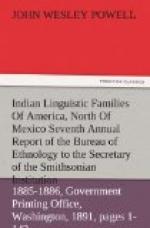> Ugaljachmutzi, Gallatin in Schoolcraft,
Ind. Tribes, III, 402, 1853
("perhaps Athapascas").
> Umkwa, Latham in Proc.-Philolog.
Soc. Lond., VI, 72, 1854 (a single
tribe). Latham, Opuscula, 300, 1860.
> Tahlewah. Gibbs in Schoolcraft,
Ind. Tribes, III, 422, 1853 (a
single tribe). Latham in Trans.
Philolog. Soc. Lond., 76, 1856 (a
single tribe). Latham. Opuscula,
342, 1860.
> Tolewa, Gatschet in Mag. Am.
Hist., 163, 1877 (vocab. from Smith
River, Oregon; affirmed to be distinct
from any neighboring tongue).
Gatschet in Beach, Ind. Miscellany,
438, 1877.
> Hoo-pah, Gibbs in Schoolcraft, Ind.
Tribes, III, 422, 1853 (tribe on
Lower Trinity, California).
> Hoopa, Powers in Overland Monthly, 135, August, 1872.
> Hu-pa, Powers in Cont. N.A.
Eth., III, 72, 1877 (affirmed to be
Athapascan).
= Tinneh, Dall in Proc. Am. Ass. A. S., XVIII, 269, 1869 (chiefly Alaskan tribes). Dall, Alaska and its Resources, 428, 1870. Dall in Cont. N.A. Eth., I, 24, 1877. Bancroft, Native Races, III, 562, 583, 603, 1882.
= Tinne, Gatschet in Mag. Am, Hist., 165, 1877 (special mention of Hoopa, Rogue River, Umpqua.) Gatschet in Beach, Ind. Misc., 440, 1877. Gatschet in Geog. Surv. W. 100th M., VII, 406, 1879. Tolmie and Dawson, Comp. Vocabs., 62, 1884. Berghaus, Physik. Atlas, map 72, 1887.
= Tinney, Keane, App. to Stanford’s
Comp. (Cent. and So. Am.), 460,
463, 1878.
X Klamath, Keane, App. to Stanford’s
Comp. (Cent. and So. Am.), 475,
1878; or Lutuami, (Lototens and Tolewahs
of his list belong here.)
Derivation: From the lake of the same name; signifying, according to Lacombe, “place of hay and reeds.”
As defined by Gallatin, the area occupied by this great family is included in a line drawn from the mouth of the Churchill or Missinippi River to its source; thence along the ridge which separates the north branch of the Saskatchewan from those of the Athapascas to the Rocky Mountains; and thence northwardly till within a hundred miles of the Pacific Ocean, in latitude 52 deg. 30’.
The only tribe within the above area excepted by Gallatin as of probably a different stock was the Quarrelers or Loucheux, living at the mouth of Mackenzie River. This tribe, however, has since been ascertained to be Athapascan.
The Athapascan family thus occupied almost the whole of British Columbia and of Alaska, and was, with the exception of the Eskimo, by whom they were cut off on nearly all sides from the ocean, the most northern family in North America.
Since Gallatin’s time the history of this family has been further elucidated by the discovery on the part of Hale and Turner that isolated branches of the stock have become established in Oregon, California, and along the southern border of the United States.




